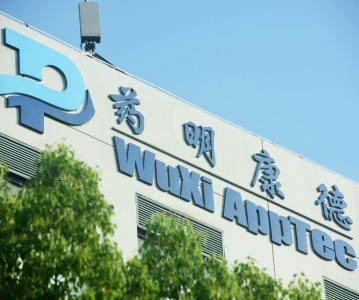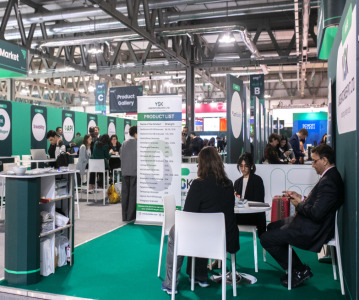Amgen presents detailed results from Phase III study demonstrating clinical equivalence of biosimilar candidate ABP 501 with adalimumab

First completed Phase III study of adalimumab biosimilar in the treatment of patients with moderate-to-severe RA.
Amgen has presented detailed findings from a head-to-head Phase III study comparing the safety, efficacy and immunogenicity of biosimilar candidate ABP 501 with adalimumab in patients with moderate-to-severe rheumatoid arthritis (RA). The results were presented today in an oral presentation at the 2015 American College of Rheumatology (ACR)/Association of Rheumatology Health Professionals (ARHP) Annual Meeting in San Francisco.
The study met the primary endpoint, which was achievement of ACR20 (20% or greater improvement in ACR assessment) at week 24. At week 24, 74.6% of patients in the ABP 501 group and 72.4% in the adalimumab group met the ACR20 response criteria. The risk ratio of ACR20 was 1.039 with the two-sided 90% CI of 0.954-1.133, which fell within the predefined equivalence margin.
"Demonstrating biosimilarity is scientifically complex, but Amgen's 35 years of proven biologic R&D experience is facilitating the advancement of exciting programs like ABP 501," said Sean E. Harper, executive vice president of R&D at Amgen. "Our long-term commitment to advancing care in inflammation is as strong as ever, with a portfolio of novel and biosimilar compounds that have the potential to benefit patients worldwide."
ABP 501 is being developed as a biosimilar candidate to adalimumab, an anti-TNF-a monoclonal antibody, which is approved in many countries for the treatment of inflammatory diseases, including moderate-to-severe rheumatoid arthritis, moderate-to-severe plaque psoriasis, moderate-to-severe polyarticular juvenile idiopathic arthritis, psoriatic arthritis, ankylosing spondylitis, moderate-to-severe Crohn's disease and moderate-to-severe ulcerative colitis.
Secondary endpoints included the achievement of ACR50 and ACR70 (a 50 or 70 percent improvement in ACR assessment) within the predefined equivalence margin. At week 24, patients treated with ABP 501 compared with those treated with adalimumab achieved ACR50 (49.2% vs. 52.0%) and ACR70 (26.0% vs. 22.9%), respectively. Additionally, the secondary endpoint of a difference in change from baseline of DAS28-CRP (Disease Activity Score examines 28 joints in the body as measured by C reactive protein in the blood) over the entire study was also achieved. The difference in mean change from baseline in DAS28-CRP between ABP 501 and adalimumab was -0.01 (90% CI, -0.18 to 0.17) at week 24.
The incidence of treatment-emergent adverse events (TEAEs) was 50% for ABP 501 and 55% for adalimumab. The most frequently reported TEAEs (for ABP 501 and adalimumab, respectively) were nasopharyngitis (6.4% vs. 7.3%), headache (4.5% vs. 4.2%), arthralgia (3.0% vs. 3.4%), cough (2.7% vs. 3.1%) and upper respiratory tract infection (1.5% vs. 3.8%). Serious adverse events (3.8% vs. 5.0%) and serious infections (0.8% vs. 1.1%) were reported in patients treated with ABP 501 and adalimumab, respectively. By the end of week 24, binding antibodies (38.3% vs. 38%) and neutralizing antibodies were identified (9.1% vs. 11.1%) in patients treated with ABP 501 and adalimumab, respectively.
Related News
-
News WuXi to sell CGT manufacturing unit to US-based Altaris LLC
At the tail end of 2024, Chinese-based CDMO WuXi AppTec announced the signing of their deal with private equity firm Altaris LLC, confirming the sale of WuXi Advanced Therapies, the cell and gene therapy manufacturing arm of WuXi AppTec. -
News Women in Pharma: Our hopes for 2025 and beyond
Our last instalment for 2024 of the Women in Pharma series brings you messages direct from the Informa Markets CPHI team as they discuss the advice and insights they have carried throughout their roles working at CPHI, and what they hope to see for the... -
News CPHI Milan Wrap-Up Report: Conference Highlights
Discover the emerging and trending topics of the pharmaceutical industry with our CPHI Milan Conference Highlights, with exclusive insight from pharmaceutical leaders and experts! -
News BIOSECURE Act not included in key defense spending bill for 2025
On December 7, 2024, the Biden administration revealed the 2025 National Defense Authorization Act, an annual defense bill specifying the budget and expenditures of the US Department of Defense. The controversial BIOSECURE Act was notably missing from ... -
News Lessons from CPHI Milan 2024: Sunny Intervals for Pharma Manufacturing?
As the 2024 CPHI conference wrapped up in Milan, we caught up with L.E.K. Consulting – a global strategy consulting firm with deep expertise in pharma manufacturing – to discuss evolving market perspectives and business outlook. -
News Trump 2.0: What does the US election result mean for the healthcare industry?
After Trump won the Presidential election in the US in early November, we take a look at some of the implications a new Trump administration could have on the health and pharmaceutical industry, and on US patients. -
News Women in Pharma: Reflections from Behind the Scenes
In this instalment of our monthly series, the team that brings you the Women in Pharma series each month sits down for a heart-to-heart on what the series means to them, and how they hope to continue their work in the future. -
News Scaling the Industry: CPHI Scale-Up Market interview with YSK Laboratories
For the first time, CPHI Milan hosted the CPHI Start-Up Market, expanding support for emerging and small-sized enterprises in their transition to the next level of growth. In this interview, we spoke with Yuvansh Khokhani, Managing Director of YSK Labo...
Position your company at the heart of the global Pharma industry with a CPHI Online membership
-
Your products and solutions visible to thousands of visitors within the largest Pharma marketplace
-
Generate high-quality, engaged leads for your business, all year round
-
Promote your business as the industry’s thought-leader by hosting your reports, brochures and videos within your profile
-
Your company’s profile boosted at all participating CPHI events
-
An easy-to-use platform with a detailed dashboard showing your leads and performance

.png)





